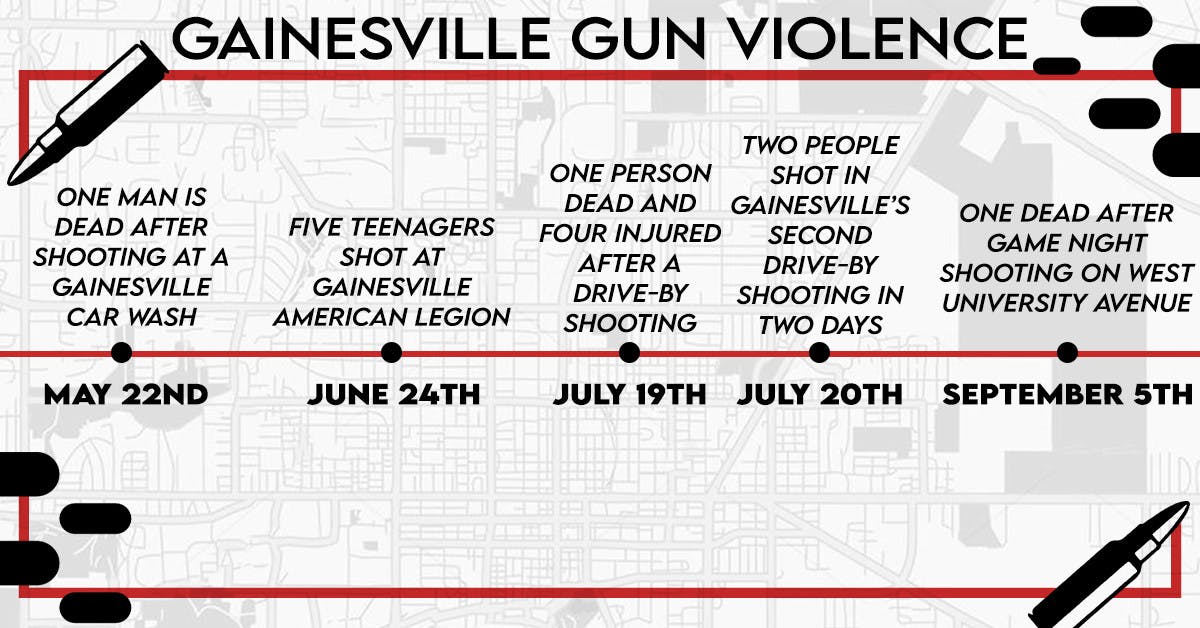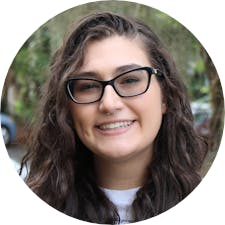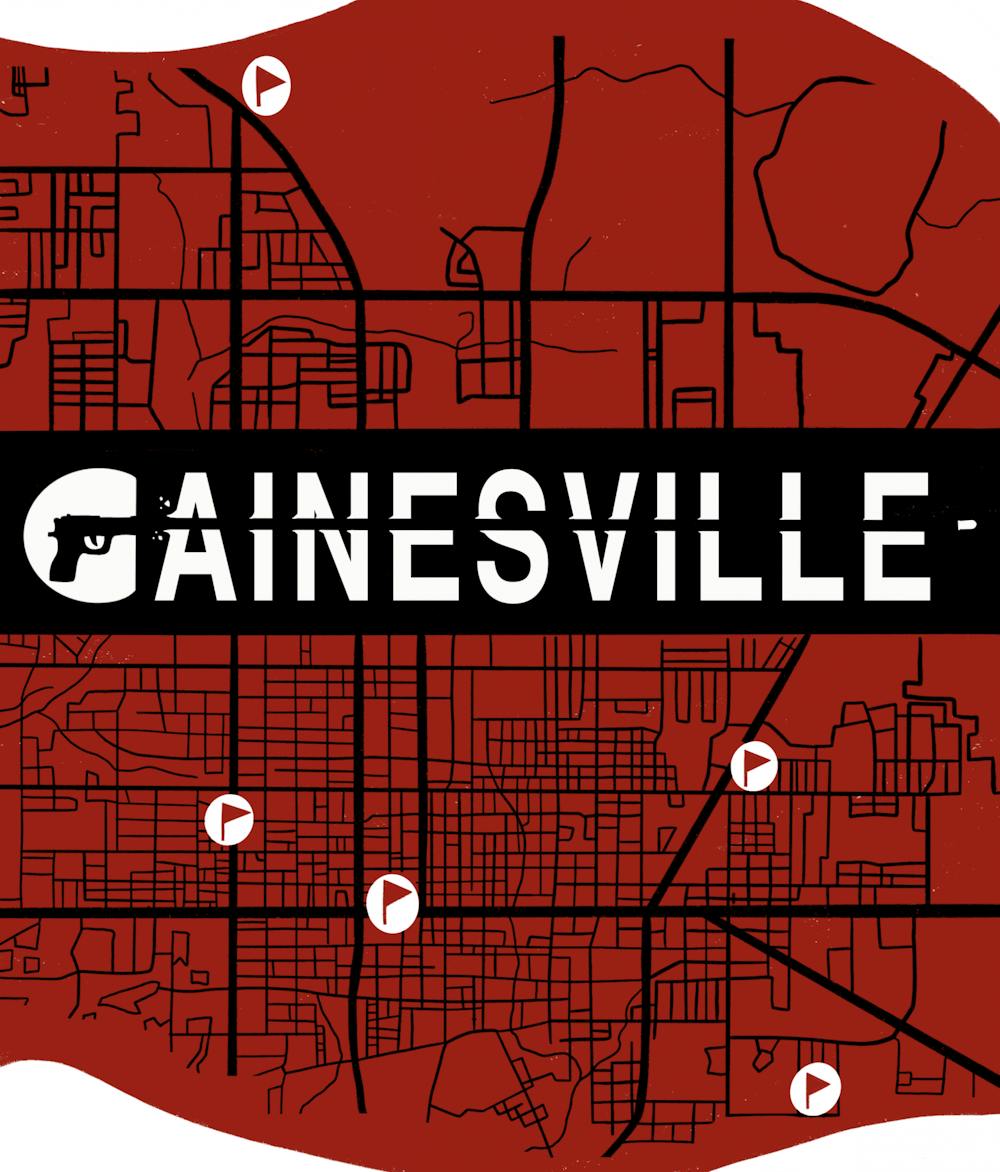Editor’s Note: This story contains depictions of gun violence
The moment Alicia Thompkins picked up the phone, she knew something was wrong.
Mom, please come get me.
Her 15-year-old daughter hid in the bathroom at a birthday party, terrified of the sounds that filled the American Legion Post. Her brother wasn’t with her.
He was close. But the bullets in the nearby party room were closer.
Hurry up, mom. I’m scared.
At 13, Thompkins’ son knows the breeze of a bullet near his cheek, the sound of lead as it pierces flesh and the grief that follows after witnessing a friend get shot.
Where are you?
The Gainesville American Legion shooting June 24 left five teenagers shot and one dead. The incident was just one of the 53 reported gun violence cases resulting in injury or death this year as of Sept. 17. Gun violence ranges from homicides to suicides, assaults to robberies.
But the shooting wasn’t an isolated event. Gainesville has seen a 26% increase in gun-related crimes that resulted in injury or death since 2019, according to a Gainesville Police Department spreadsheet.
The city reported 53 of these cases in 2020, a number it already reached with three months left in 2021. Reported gun violence cases resulting in injury or death from 2017 to 2019 fluctuated between 23 and 42 — but never reached numbers as high as today.

Despite the pandemic spike, GPD Chief Tony Jones has tried to address gun violence in the city through his prevention, intervention and suppression initiative. His plan called One Community includes more community engagement and an anonymous gun buyback program with gift certificates as an incentive. It also reminds residents to avoid leaving guns in cars and doors unlocked.
“We sat down with neighbors … and we wanted to hear what their thoughts were in regards to crime in Gainesville and particularly gun violence,” Jones said. “Every group that we listened to all were asking for an end or a reduction in the amount of violence.”
GPD is recruiting a group of residents to review the plan’s progress and find the root causes for gun violence in the area, Jones said. He hopes the committee will be established sometime in October.
“We, as a community, understand that this is not just a police problem,” he said. “This is a community problem. That's why we named [the effort] One Community.”
The department, Jones said, has received fewer calls of shots fired as of Sept. 17. But despite what looks like a drop, gun violence trauma remains.
“Any person that dies as a result of gun violence rather than natural causes … is a tragedy within any community,” Jones said. “We, therefore, want to make sure that they have the right counseling services that would be available for them because you don't want them to carry this trauma around unaddressed.”
When Thompkins picked up her children from the American Legion Post, she noticed trauma’s effects firsthand.
They trudged to their rooms, but their lights never turned off.
That morning, she noticed her son’s eyes were bright red. She found her daughter in tears.
“I knew that he didn’t sleep at all,” she said. “My daughter said everytime she closed her eyes she could see [the victim] on the ground.”
The trauma has extended to Thompkins, too.
Since the incident, she has become overprotective of her children. She drops them off at the bus stop, picks them up from school when she can and sits in the parking lot whenever they attend football games.
She used to drop them off and let them have a good time. Now, her fearful tone whenever she speaks to them is a constant reminder of that June day.
I need to be here. When this game is over, I need you to get in the car.
“They can't even hang out and be kids and talk with their friends because I'm afraid something is going to happen,” she said.
Thompkins’ children each deal with the shooting differently. Her daughter has breakdowns often. Her son asks a lot of questions.
“He feels that it wasn’t [the victim’s] time, and he was too young,” Thompkins said. “I would say he is doing a little bit better. He just has those days where he's kind of like my daughter but just not as emotional.”
Thompkins, too, is no stranger to loss.
When she was 13, she lost her mother to AIDS. In 2016, she lost a cousin to gun violence. She never wanted to go to therapy and worried her children wouldn’t want to either.
“When my kids lost their friend, they wanted counseling,” she said. “They didn’t ask no questions. They didn’t ask what it was. They didn't ask what they were going to be doing. All they knew was that they didn't like the way they felt.”
If there was something positive to come out of this tragedy, it was that her children’s courage inspired her to start therapy this year.
Mental health services could curb gun violence incidents, said Tiffany Jenson, a UF criminology professor. She wishes more people would seek therapy and other treatments.
“Unfortunately, there is a lack of mental health solutions out there for people,” she said. “Often, gun violence and violence of any kind can happen in these very passionate moments where people felt the loss of control.”
Gun violence is often spontaneous. It’s interpersonal conflict that escalates into something deadly.
And that’s something experts feared during the pandemic. Stay-at-home orders and lockdowns forced people to be together for long periods of time, which could be linked to a spike in violence, Jenson said.
College towns like Gainesville also suffered deeper economic blows than bigger cities because of temporary and part-time jobs related to UF and UF Health. The pandemic increased unemployment, which Jenson believes could contribute to gun violence.
Alachua County’s Crisis Intervention Team received special training to de-escalate situations with mental illness crises. Bystanders, Jenson said, should report when they suspect instances of gun violence may occur. The CIT can also connect survivors to relevant mental health services.
Tonya Edwards, a certified advanced grief recovery specialist in Gainesville, listens to almost all of her clients ask three questions.
What could’ve I done differently? Done more of? Done better?
“Grief is definitely the normal and natural reaction to any kind of significant emotional loss,” Edwards said.
Adults process grief logically. Children don’t. They don’t understand what happened but feel a different atmosphere in their home.
“Grief is not logical,” Edwards said. “It’s emotional. So when you try to process this logically, it’s never going to make sense.”
Children in the community exposed to these tragedies, Edwards said, are dealing with unresolved grief. Parents should sit down and talk through the trauma with their kids, she said.
Edwards is concerned for Gainesville’s youth. Several gun violence victims have been minors.
“Starting today, we're going to lose a generation of people,” she said. “We're going to lose a generation to something so senseless.”
Trauma related to gun violence never really goes away.
In the center of the pink-and-yellow dogwood blossoms that were tattooed on Sarah Browder's right arm laid a bullet hole.
Her ex-husband shot her twice on the shoulder and through her spine before he pulled the trigger on himself Sept. 23, 2012. Following Sarah’s death, her mother Susan Browder became an activist against gun violence.
Last fall, Browder moved from North Carolina to Gainesville to be near her other daughter and grandchildren. The retired teacher spends her free time organizing to prevent this from happening to anyone else’s children.
“She was funny and beautiful, smart and artistic, and she was stolen from us,'' Browder said. “She was stolen from us by a violent man who was able to get a gun without submitting to a background check.”
At 29, her daughter fought for her life in the intensive care unit for four days. Now, Sarah’s branch of the Browder’s family tree is forever cut off.
“We will always grapple with the reality of all the years ahead,” Browder said. “Her chair will be empty and all those other empty spots because it wasn't just Sarah. It was her future loves, her future children, her grandchildren. It really changed the arc of the future for generations to come.”
Gun and domestic violence intertwine, Browder said. About 1 million women in the U.S. have been reported shot by a significant other, according to The Educational Fund to Stop Gun Violence. The pandemic pushed people to buy firearms, which could be deadly for their partner.
As an advocate, Browder deals with her grief through her work with domestic violence victims. She also teaches teenagers about signs to watch out for in abusive relationships.
“I finally realized that I can maybe help more people by using my voice to raise awareness and by trying to take steps to get easy access to guns limited for violent people who shouldn't have them,” Browder said.
Browder and her organization, Everytown for Gun Safety, are pushing to end gun violence tragedies and require universal background checks for those purchasing a firearm.
“It's especially traumatic knowing that it was just needless,” Browder said. “It did not have to happen, and it could have been prevented if some things had been different.”
Thompkins and her children share this feeling. The young boy’s death that night at the American Legion was just needless. It didn’t have to happen. But it did, and their lives are forever altered because of it.
Contact Isabella Douglas at idouglas@alligator.org. Follow her on Twitter @Ad_Scribendum

Isabella Douglas is a fourth-year journalism major and the Fall 2023 editor-in-chief for The Alligator. She has previously worked as the digital managing editor, metro editor, criminal justice reporter and as a news assistant. When she isn't reporting, she can be found reorganizing her bookshelf and adding books to her ever-growing TBR.






